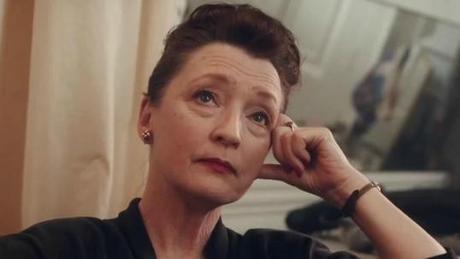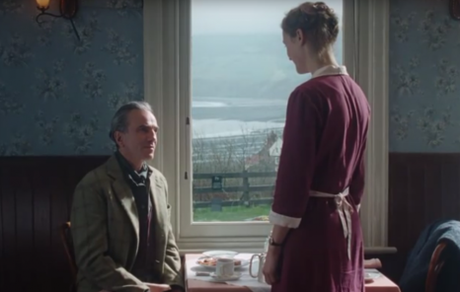Paul Thomas Anderson's Phantom Thread stitches itself together with the threads of different genres: It's part bitter romantic comedy, part gothic horror, part chamber drama, and all glossed with a surface level delectability. Its mood shifts would feel schizophrenic and undisciplined if not for Anderson as its architect and the efforts of the brilliant cast he has assembled. Instead, the film grips you in its world of soft-spoken people behaving badly and dressing flawlessly. It wasn't in my Top 10 films of 2017 because I didn't have access to its unique spell until recently. However, it would be there now.
To describe the film's narrative is to drift through an exercise in futility because like the secret messages Daniel Day-Lewis's designer weaves within his creations' seams, the film's exquisiteness rests beneath the surface. However, this is still a film review and narrative plays a role.
Lewis plays Reynolds Woodcock, London's premier designer. Day and night, he sketches and creates, charms the women who come to him to look beautiful, and obsesses over every fine detail. He's a man affixed to his routine and particular in his tastes, controlling every facet of his life from the lines of his clothing to the use of butter on his asparagus. His job is to create perfection, and his routine is his own personal perfection.
Reynolds lives with his sister, Cyril (Leslie Manville). Ensconced in their picturesque world, they play off of one another like a bickering, if affectionate, old married couple, each used to the others' eccentricities and needs. He can bellow, and she can silence with a well-cocked eyebrow. She tends to the business side of his dress empire and any emotional matters that may be too complicated.

While sitting in a cozy, British café, Reynolds meets the decidedly non-British Alma (Vicky Krieps), a young waitress who can remember his remarkable breakfast order without having to write it down. He invites her into his life, making her his assistant and muse, with no thought to the kind of intimacy such an arrangement might entail.

There's evidence Alma may be just the next in line of a succession of women that have flittered in and out of Reynold's world, jettisoned when they're no longer worth the trouble they cause. We even see one earlier, dismissed off-screen when the irritation she causes outweighs the pleasure she brings.
At first glance, Alma's situation isn't that different. She frustrates Reynolds with her toast buttering and tea pouring, as well as her refusal to exist as a mere decoration in his insular little world. This is a film in which table setting and dinner preparations are loaded with so much tension, they may as well be battle strategies. However, Alma is growing accustomed to residing within Reynold's sphere of influence, and she can create her own opportunities the same way Reynolds can create gowns.

There's an element of Jane Eyre to Phantom Thread, with a young, poorer girl living in a mansion with a temperamental, emotionally troubled man. He thinks he might be cursed and is haunted by a woman from his past (in this case, however, it's his mother, not a wife). However, it's unclear whether the "madwoman in the attic" is already lying in wait or being invited into the home. Reynold's home may be a bit warmer than Rochester's cold, dark mansion, but Reynolds comments on the "air of quiet death" in the house feel of apiece.
Bearing those gothic overtones in mind, I spent a lot of Phantom Thread's running time trying to discern exactly which story the film was telling. Is it about the burden of being an artist or the burden of loving a temperamental artist? Is it about an artist trying to mold and control a muse who doesn't wish to be molded? It plays with all of these questions, while ultimately telling a twisted love story that's a thematic cousin to Anderson's Punch Drunk Love, in which damaged people connect because their psychological baggage meshes.
When it comes to a film this centered on its characters' psychological underpinnings, it either lives or dies based on the actors involved, and Phantom Thread's performances are all uniformly strong. It's been billed as Daniel Day-Lewis's swan song and, if that holds true, it's a fitting end. His Reynolds is the embodiment of a gothic romance lead, stalking through his mansion, exuding his own unique brand of sensuality. He's haunted, sometimes literally, by the specter of his mother, and always seems to be working to find someone who can fill the void she left behind. Day-Lewis, who previously worked with Anderson to create There will be Blood's misanthropic, opportunist lead monster, is an actor who can almost always be compelling even in films that don't entirely deserve his talents. Playing a man who obsesses over every facet of his routine and every thread of his creations may not seem like a major stretch for the someone famous for his method approach to roles, but this is a perfect coupling of actor and role.

There's a moment when he confronts Alma about the changes she has made to his routine, exclaiming, "Were you sent here to ruin my evening and possible my entire life?" It's sort of funny, because it's simply a dinner preparation that has prompted such an outburst, but there's an underlying poignancy to it as well. This is a character who has spent so much time retreating within his own rituals and practices, he's at a complete loss when someone shows up and changes the rules. The character is so closed-off and that could leave him a dreary blank, but like everything else in the film, it's a joy to peel away the layers for the meaning beneath.
Leslie Manville and Vicky Krieps are given the unenviable tasks of holding their own against one of the greatest actors of his generation, and they do so with aplomb. The fact that the film is bitingly comical mostly stems from Manville's Cyril, whose withering asides yield some shockingly laugh-out-loud moments. My personal favorite is directed at Reynolds: "Don't pick a fight with me. You certainly won't come out alive, and it'll be you who ends up on the floor." Holding your own in a scene with Daniel Day-Lewis is challenging enough. To nearly steal his spotlight is something even more remarkable.
Krieps, in contrast, has to oscillate between frustrated ingénue and a master manipulator. It's a tricky balancing act, but she maintains it well. She manages to create a character that can design her life, manipulating people and circumstances when they don't suit her in the same way Reynolds designs his gowns. Both women do fine work existing as two points in a power struggle triangle where it's never entirely clear who has the upper hand.
Like a finely stitched garment, all of Phantom Thread 's elements weave together to create a truly glorious tapestry, but determining exactly what kind of film it is remains a trickier notion, with an overlay of the gothic that makes the film darker and more warped that its high gloss trailers would indicate. It's a film about weaving your own life out of the materials available to you. Whether those threads yield flawless art or become inextricably gnarled and tangled depends on the skill of the seamstress, and there are some very skilled seamstresses trying to craft their own little worlds. The resulting film is one of the most beautiful and peculiar of recent memory.

